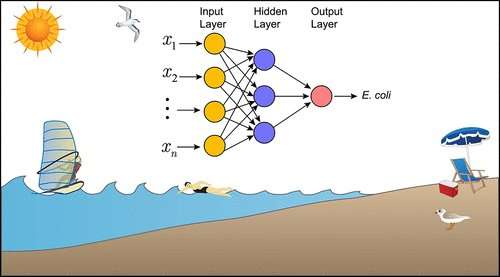'Nowcasting' beach water quality

Arriving at your favorite beach only to discover it's closed because of bacterial contamination can be a bummer. But even worse would be unknowingly swimming in waters polluted with fecal material—a very real possibility, given that current detection methods can require up to 24 hours to obtain results. Now, researchers reporting in the ACS journal Environmental Science & Technology have identified computer models that provide accurate short-term forecasts, or "nowcasts," of beach water quality.
The number of beach closings due to fecal microbes has risen in recent years. In the U.S., beaches in the Great Lakes region rank high among those with the worst problems. According to the Michigan Department of Environmental Quality, 30 beaches in the state were either closed or had advisories associated with them in early July 2018 because of high bacteria levels. Collecting water samples and then analyzing them in the lab takes time, even with modern techniques, which puts swimmers at risk of infection with nasty stomach bugs while testing is ongoing. But computer simulations for predicting water quality are complex and not always reliable. Jie Niu and Mantha S. Phanikumar wondered if they could identify simpler computer models that could accurately predict current beach conditions from past data.
The researchers compared the abilities of five computer models to nowcast bacterial levels at four sites in Southern Lake Michigan. The models varied in the number of input parameters, from only past levels of bacteria at the sites, to more complex data, such as daily rainfall, water temperature and water turbidity. The team found that the two best models incorporated past bacterial levels and several of the other parameters. However, a new model developed by the researchers also performed well. This approach, which combined two techniques called wavelet transform and artificial neural network analysis, required only bacterial data from the past, with no additional inputs. The researchers concluded that the new model is a potentially useful tool for beach management, especially when detailed data on beach conditions aren't available.
More information: Juan Zhang et al. Real-Time Nowcasting of Microbiological Water Quality at Recreational Beaches: A Wavelet and Artificial Neural Network-Based Hybrid Modeling Approach, Environmental Science & Technology (2018). DOI: 10.1021/acs.est.8b01022
Abstract
The number of beach closings caused by bacterial contamination has continued to rise in recent years, putting beachgoers at risk of exposure to contaminated water. Current approaches predict levels of indicator bacteria using regression models containing a number of explanatory variables. Data-based modeling approaches can supplement routine monitoring data and provide highly accurate short-term forecasts of beach water quality. In this paper, we apply the nonlinear autoregressive network with exogenous inputs (NARX) method with explanatory variables to predict Escherichia coli concentrations at four Lake Michigan beach sites. We also apply the nonlinear input–output network (NIO) and nonlinear autoregressive neural network (NAR) methods in addition to a hybrid wavelet-NAR (WA-NAR) model and demonstrate their application. All models were tested using 3 months of observed data. Results revealed that the NARX models provided the best performance and that the WA-NAR model, which requires no explanatory variables, outperformed the NIO and NAR models; therefore, the WA-NAR model is suitable for application to data scarce regions. The models proposed in this paper were evaluated using multiple performance metrics, including sensitivity and specificity measures, and produced results comparable or superior to those of previous mechanistic and statistical models developed for the same beach sites. The relatively high R2 values between data and the NARX models (R2 values of ∼0.8 for the beach sites and ∼0.9 for the river site) indicate that the new class of models shows promise for beach management.
Journal information: Environmental Science & Technology
Provided by American Chemical Society




















